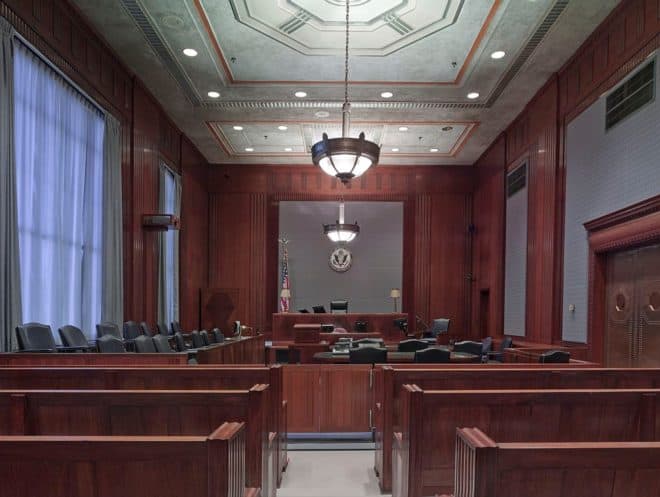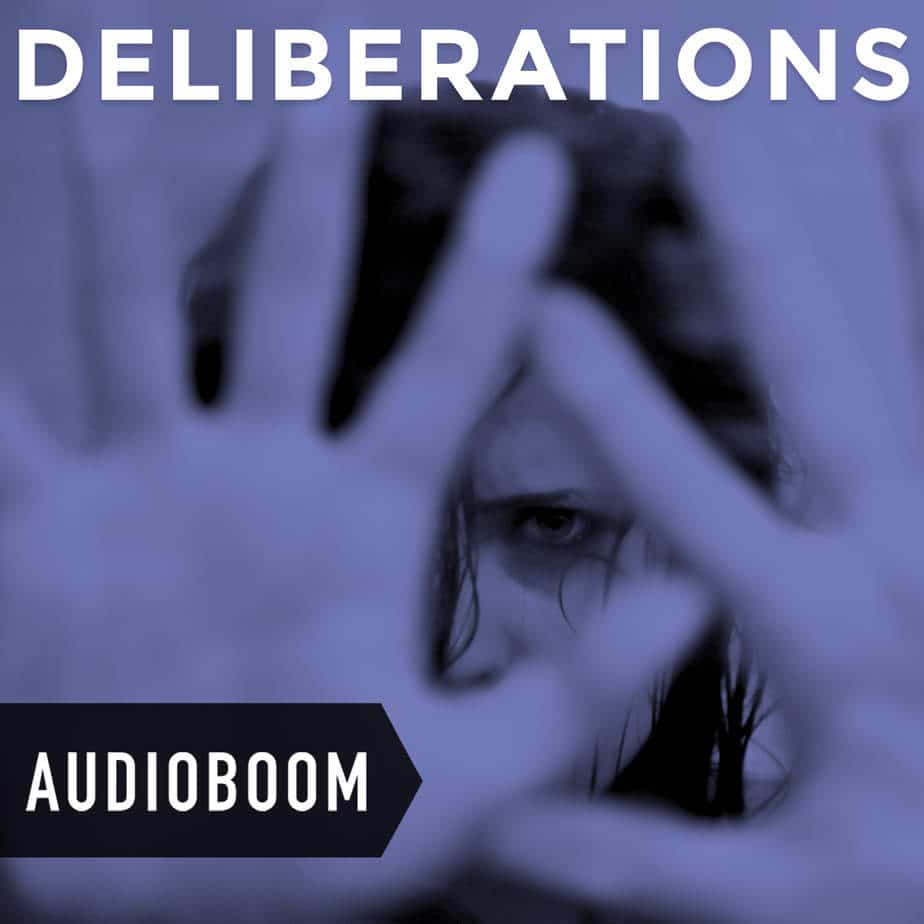Q&A: Deliberations Brings a Fresh Format to True Crime

When the Casey Anthony trial dominated the evening news in her central Florida hometown, Chelsea Cox became hooked on true crime. Over time, her interest in the genre boiled down to one question: What happens in a jury’s deliberation?

Discover Pods interviewed Cox to learn more about how she approached the project, why she believes the semi-scripted format can deliver a greater degree of authenticity in a fictional story, and how she signed with AudioBoom.
This interview has been edited for length and clarity.
Discover Pods: What prior experiences with podcasts did you bring to this project?
Cox: This is my very first podcast. I’ve worked previously in digital advertising, as a copywriter, and in print media, but I really wanted to get into audible media. I’m a huge consumer of audiobooks and podcasts, and I just love audio storytelling.
I saved up a lot of money, and then I poured everything I had into making this podcast happen. I learned sound editing, I learned recording. I bought the equipment and set up a sound studio in a spare bedroom in my apartment. I cast people for the first time, I learned to direct. I learned the entire process myself over the last year
It’s been a true labor of love for me. This is the most exciting thing I’ve ever created–I couldn’t be more thrilled that it’s launching soon.
DP: Did you start this project as a weekend warrior?
Cox: Over the past year, I was working primarily as a freelancer. I still took sporadic jobs, but I really took a chance and leaned on my savings in order to pour as much time and energy into creating this as possible.
A large part of that was learning everything that I needed to learn. I feel like i’ve been working on this forever, trying to make sure everything is perfect and that I did justice to the vision that I had in the beginning.
DP: Was there anything along the way that surprised you?
Cox: Everything was harder than I thought! Sound editing specifically. That was a real challenge for me.
The casting process was one of the hardest things that I did, but also the most rewarding. I feel so incredibly lucky to have assembled the talented group of performers that I have. Half of the podcast is scripted testimony and evidence, and the other half of the podcast is completely improvised–just six people in a room listening to this controversial evidence and then debating it amongst themselves.
It’s a bit of a risky thing to lean so heavily on something you can’t control. I wanted it to be authentic and I wanted it to be genuine, so I remained as hands-off as possible and offered as little input as possible. I basically was quiet the entire time while they just spoke.
I have to say, it could not have turned out better. The six people who were debating the evidence were impassioned. They were so intelligent. The way that they navigated those conversations and the strong opinions they took, personal biases they exposed, and the conflict that arose as they called each other out on things they didn’t think were right–it really turned into an emotional piece. To those actors, I just tip my hat. That was amazing work.
DP: Did you have any inspiration for the approach to the semi-scripted format? Had you considered doing it other ways?
Cox: I realized that with fictional podcasts, it’s extremely difficult to create an authentic-sounding performance. When things are scripted and you have no visual cues, it’s hard to replicate a genuine experience for the listener with actors just reading lines.
One of the most appealing things about talk radio and about podcasting was that it felt so organic. You could hear people thinking and stumbling over their words and talking over one another, and it took you to a genuine place.
I wanted to find a way to create something fictional that felt truly, truly real–and in my opinion, the best way to do that was to allow people to get as real as possible. Sure, write about fictional circumstances, but then have people talk about it as they think of it on the spot, as they are reacting to one another.
The format is possibly the most special thing about this project. I hadn’t seen the semi-scripted format before in podcasting. It works so beautifully. It’s a great way to tell a fictional story in a way that sounds and feels real and gets real.
DP: How did these two halves of the podcast complement each other?
Cox: With the courtroom scenes, I directed the actors so they would deliver their lines as drily as possible. This is not like a not highly dramatized or theatrical-feeling experience. This is like, “just the facts ma’am” inside of a court room, being dry and professional.
In the deliberations room, I assembled a cast of six jurors who all had improv experience, so they were comfortable thinking on their feet, reacting to one another, just being moment-to-moment. I gave them each a character profile–which was less than a paragraph, so very little to build on.
For example, I had a red-stater–someone very conservative and born again–and then another member of the jury was a blogger for a feminist website and an outspoken lesbian. Just totally different world views, perspectives, life experiences. And everybody kind of assumed their role inside the courtroom, and then argued and debated genuinely from that character as they could.
I found out that people all tended, in the end, to believe the way that their characters were arguing.
It was an interesting human study for me, because it really speaks to verification bias. If you’re just trying to find corroborating evidence for whatever you believe, that is the way you’re going to continue convincing yourself that you’re right. Even these performers were somewhat subject to that, and I found that very interesting.
DP: How did you decide to create the specifics of this fictional court case?
Cox: There have been a few BDSM-related murder trials that have taken place internationally. They’re not extremely common; this is not based on an actual case.
We’re in this period in our culture where we’re trying to be sex positive, and we’re embracing alternative sexual orientations and lifestyles. That’s all great, but there seems to be this lingering judgment about sadomasochism. Some people with other alternative lifestyles are comfortable coming out and being open about them and are generally accepted, but with BDSM I haven’t really seen that. And I’ve also noticed that practitioners of that lifestyle they tend to not be open about that. So, I was curious to see why that was.
Inside an intense deliberations room, when people are confronted with very controversial evidence related to something as controversial as BDSM–how would people view that? How would it influence the way that they’re perceiving the defendant? How would those personal biases influence the way that they’re interpreting evidence? I thought that it would offer a lot of opportunities to showcase the way that personal biases influence decisions that they really shouldn’t.
DP: How did the cast experience the trial?
Cox: I recorded the entirety of the courtroom scenes in advance, then edited that evidence in an audio format. When I had my six jurors inside the deliberations room, I would play the courtroom evidence for them, and then they would debate what they had just heard.
Over the course of the season, they kept hearing and learning more evidence as eventually the listening audience would hear and discover this evidence. It’s a little bit like the listener can go on the same journey as the jurors themselves. The idea is to make the listener feel that they’re inside the deliberations room, inside the discussion, and that they’re listening to this verdict come to be.
DP: What was your production timeline like?
Cox: I had the cast for two days straight inside of one little studio in my spare bedroom. I had lined the room with packing blankets because that’s a DIY method for soundproofing a room, so they were inside at a long conference table with chairs and microphones and with black, black blankets hanging everywhere. It was very dark, and that added to the tension they experienced. They just had to sit there, hour after hour, just hashing out. It took a total of two days.
The jury system is flawed. It’s extremely difficult. You’re sitting in a box for several days–several weeks potentially–and you only get to hear testimony once and just write down whatever notes you can. You rely on your memory so much. I think people probably misremember a lot of things, which is a terrible thing to have happen inside of a jury room. Sure, they can refer to the transcripts, but how often do jurors reread the entire transcript of a trial they just sat through? I don’t think it’s that often.
I witnessed that too. Some people would mishear things and misspeak when they were deliberating, and no one would pick up on it or catch it and I didn’t want to intervene because there is no one in real deliberations rooms that will correct you if you misremember something or misquote a witness, you just have to continue watching that process unfold, the good the bad and the ugly.
DP: That’s also assuming that the testimonies themselves have been remembered correctly.
Cox: Right! These people are just random civilians who happen to be in a box together. It’s a very odd system when you think about it. And that’s another thing I wanted to raise questions about. Is this really the best method of deciding convictions? How diverse should juries be? Are bench trials potentially more effective in mitigating wrongful convictions?
DP: Are you hoping to change listeners’ minds in some way?
Cox: I want to raise questions. But I also think that season to season, I have the opportunity to raise discussions about other practices. In season one, we’re talking about a sexual lifestyle that carries a lot of judgment, and question whether our misunderstanding can affect something as serious as deciding a person’s fate.
In season two, we’re going to be discussing an allegedly false confession. I want to explore the way interrogations are performed. There are a lot of questions to be raised about interrogation methods and confessions in this country, and about how frequently they lead to wrongful conviction.
DP: If you could do this again, what would you do the same?
Cox: I’m glad that I enlisted two guest stars with real life experience in this subject to appear on the podcast. In the trial, a professional dominatrix whose client was the victim appears as a witness, and she talks about her personal experiences with the victim. I cast a real life dominatrix for the role. Her name is Mistress Justine Cross, and I think she’s arguably the most famous dominatrix in LA, if not a much larger area.
I was a little nervous hiring someone who wasn’t a professional actor to play that role, but she blew me away. She was so polished, so poised. She brought this really sultry professionalism to the role, and I think just having someone with real life experience in this subject brought a real-life authenticity to the project.
The same is true for the rope bondage expert the lawyers call to the stand. That was played by Miss Cassie, who teaches workshops and understands the practice of rope play and safe bondage. I was really happy to have brought that genuine feel and presence to the project to share with the other actors.
DP: What would you do differently?
Cox: I’d definitely give myself more time to cast. It was a whirlwind process, and I underestimated how long that would take me, and how difficult it would be.
If I’d had the budget to hire someone to edit the whole project together, I would have used it for that. That was the most time consuming part for me, although I’m happy that I learned how to do that and I want to continue doing it moving forward, especially as I’m a bit of a control freak.
Other than that, I think I would have just tried to move faster, because I have been working on this for so long, and waiting and waiting and waiting for this final project. If I could have found ways to be more efficient and brought this to fruition even faster, that would have been lovely!
DP: What’s next for Deliberations?
Cox: I have some exciting news–I signed a contract with audioBoom, so I’m officially an audioBoom podcast now! I’m joining their new wave of original content.
It happened in the funniest way; I reached out about sponsoring some of their other podcasts, and when I sent them my materials to show them that I was a legitimate person and brand, they loved it! They reached out to me and they decided to collaborate with me on this and to support the podcast and lift it up as much as they could.
I expected that I would put it out myself at first, spend a few seasons trying to build it up, and cobble together budget for marketing, and try to grow it from as grassroots a level as possible. And then maybe one day down the line, I would get an email about someone who is interested in collaborating. But I didn’t know it would be possible to join a company like audioBoom before I even launch. I’m ecstatic.
AudioBoom have this amazing catalog of shows, particularly in true crime. They represent Undisclosed, Up and Vanished, Truth and Justice and really top level shows, so I feel very honored and humbled to be joining their team, and really excited about the possibilities that this opens.













Comments
Comments are closed.